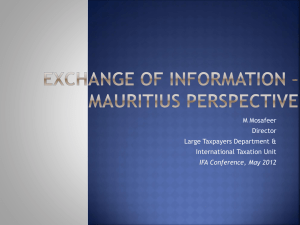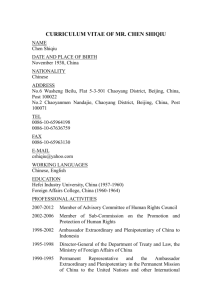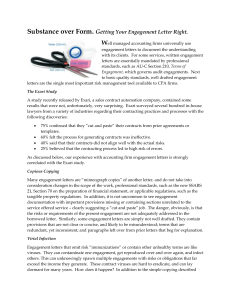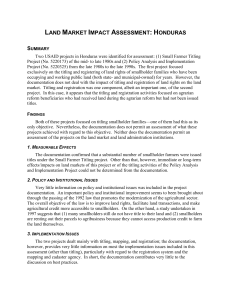Land Administration Reform Act (LARA)
advertisement
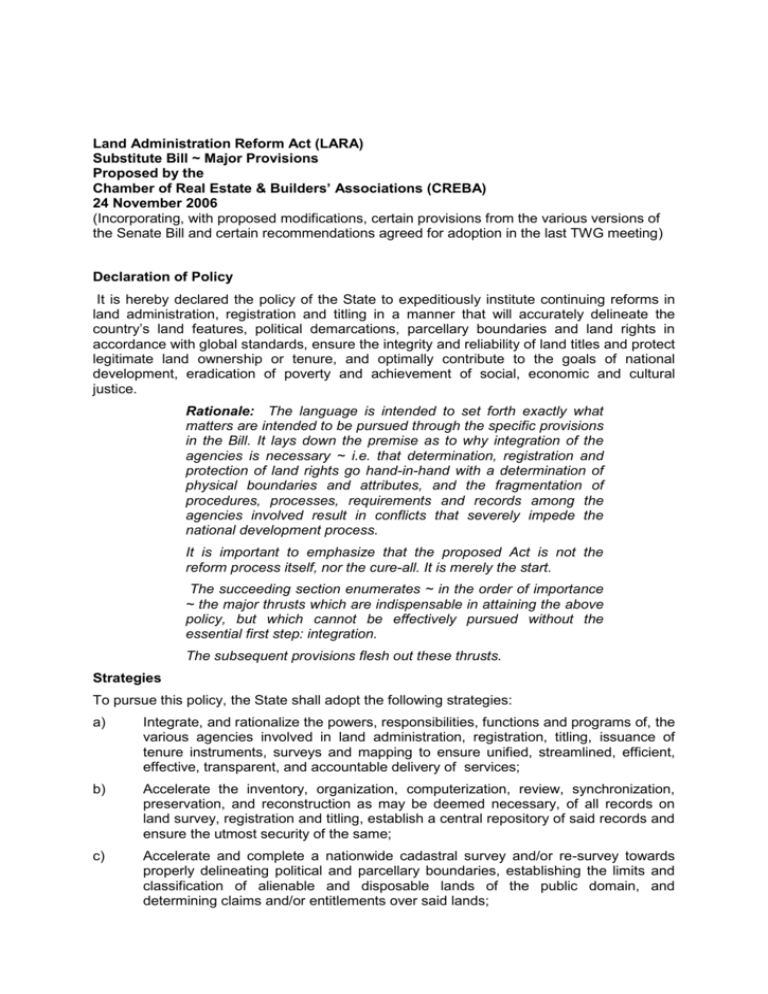
Land Administration Reform Act (LARA) Substitute Bill ~ Major Provisions Proposed by the Chamber of Real Estate & Builders’ Associations (CREBA) 24 November 2006 (Incorporating, with proposed modifications, certain provisions from the various versions of the Senate Bill and certain recommendations agreed for adoption in the last TWG meeting) Declaration of Policy It is hereby declared the policy of the State to expeditiously institute continuing reforms in land administration, registration and titling in a manner that will accurately delineate the country’s land features, political demarcations, parcellary boundaries and land rights in accordance with global standards, ensure the integrity and reliability of land titles and protect legitimate land ownership or tenure, and optimally contribute to the goals of national development, eradication of poverty and achievement of social, economic and cultural justice. Rationale: The language is intended to set forth exactly what matters are intended to be pursued through the specific provisions in the Bill. It lays down the premise as to why integration of the agencies is necessary ~ i.e. that determination, registration and protection of land rights go hand-in-hand with a determination of physical boundaries and attributes, and the fragmentation of procedures, processes, requirements and records among the agencies involved result in conflicts that severely impede the national development process. It is important to emphasize that the proposed Act is not the reform process itself, nor the cure-all. It is merely the start. The succeeding section enumerates ~ in the order of importance ~ the major thrusts which are indispensable in attaining the above policy, but which cannot be effectively pursued without the essential first step: integration. The subsequent provisions flesh out these thrusts. Strategies To pursue this policy, the State shall adopt the following strategies: a) Integrate, and rationalize the powers, responsibilities, functions and programs of, the various agencies involved in land administration, registration, titling, issuance of tenure instruments, surveys and mapping to ensure unified, streamlined, efficient, effective, transparent, and accountable delivery of services; b) Accelerate the inventory, organization, computerization, review, synchronization, preservation, and reconstruction as may be deemed necessary, of all records on land survey, registration and titling, establish a central repository of said records and ensure the utmost security of the same; c) Accelerate and complete a nationwide cadastral survey and/or re-survey towards properly delineating political and parcellary boundaries, establishing the limits and classification of alienable and disposable lands of the public domain, and determining claims and/or entitlements over said lands; Land Administration Reform Act (LARA) Proposed Substitute Bill CREBA d) Accelerate the review, rationalization and codification of the various laws pertaining to land registration, titling, public land administration, management and disposition, towards making the procedures, processes and requirements therefor expeditious, affordable, reliable, transparent and contributory to national goals, and recommend to Congress the appropriate legislation; e) Institute measures to eradicate title fraud; f) Accelerate and complete topographic and other mapping activities nationwide towards updating spatial data vital to land administration, titling and development planning of both the government and private sectors; g) Rationalize the procedures, processes and requirements in public land administration, management and titling to ensure equitable disposition, registration of rights, and sustainable utilization and development of alienable and disposable lands taking into account ecological considerations; h) Accelerate the computerization of functions and delivery of services; i) Upgrade technical capabilities and resources to ensure efficient and reliable land survey, mapping and classification and/or reclassification, and rationalize and prescribe uniform standards for land survey and mapping, consistent with global standards, to be observed by the government and private land sectors; j) Assist in upgrading the capabilities of local government units towards optimal land use mapping and zoning, land regulation and taxation, and public land administration in their respective territories; k) Provide technical assistance to the mapping, zoning and land administration and regulation activities of local government units; l) Undertake a continuing skills-upgrading program for all personnel involved in the delivery of land services; m) Mainstream gender in all aspects of the land administration system; and n) Recognize, respect, ensure participation, and assist in the enforcement of land related rights of men and women of the basic sectors, as defined in Republic Act No. 8425, otherwise known as the “Social Reform and Poverty Alleviation Act.” Creation and Mandate of the Land Administration Authority There is hereby created under the Office of the President a Land Administration Authority (LAA), hereinafter referred to as Authority, which is hereby mandated to pursue and implement the State policy set forth in Section 2 hereof through the strategies enumerated in Section 3 hereof and such others as may be necessary in carrying out this mandate. Rationale: The Authority should logically and properly be placed under the DENR which is, after all, responsible for the country’s natural resources ~ and land is the quintessential resource. Placing it under the Office of the President is seen merely as a workable compromise to resolve the battle for turf and ascendancy among the agencies involved. Powers and Functions of the Authority The Authority shall have the following powers and functions: 2 Land Administration Reform Act (LARA) Proposed Substitute Bill CREBA a) Land Survey & Mapping 1) Execute nationwide cadastral surveys in accordance with the provisions of Act No. 2259 as amended, and update all existing cadastral maps 2) Conduct nationwide survey and topographic mapping to assist Congress in determining the specific limits of forest lands and national parks, to delimit the specific boundaries and classification of alienable and disposable lands of the public domain, and to identify the specific boundaries of environmentally protected areas under Republic Act 7586 otherwise known as the National Integrated Protected Areas System (NIPAS) 3) In coordination with local government units and the pertinent agencies, conduct and/or approve surveys and mapping necessary in the implementation of Republic Act No. 7160 or the Local Government Code, Republic Act No. 7279 or the Urban Development and Housing Act, Republic Act No. 8435 or the Agriculture and Fisheries Modernization Act (AFMA), Republic Act 7916 or the Ecozone Law, Republic Act No. 6657 or the Comprehensive Agrarian Reform Law (CARL), Republic Act No. 8371 or the Indigenous Peoples Rights Act (IPRA), and other existing laws requiring survey and mapping; 4) Verify and approve all private land consolidation, subdivision and consolidationsubdivision surveys intended for titling purposes; 5) Prescribe standards, rules and regulations for the conduct of all kinds of geophysical surveys, mapping, aerial photography, remote sensing and similar activities in accordance with existing laws and internationally accepted principles, practices and standards; 6) Prescribe a uniform base map that shall be used for all public and private mapping activities, and provide convenient and affordable public access to the same; and 7) Establish and maintain an appropriate custodial and storage system that shall ensure the security and integrity of all survey and mapping records. b) Land Registration and Titling 1) Register original titles to land and subsequent dealings in registered land under the provisions of, and subject to the conditions and requirements prescribed in, Act No. 496 and Presidential Decree No. 1529 as amended; provided, that prior to registering a tenure instrument and issuing an original certificate of title based thereon, the Authority shall first verify compliance with the conditions and requirements prescribed under the law authorizing the issuance of said tenure instrument; 2) Undertake cadastral registration under the provisions of, and subject to the conditions and requirements prescribed in, PD 1529; 3) Establish and maintain an appropriate custodial and storage system that shall ensure the security and integrity of all registration and titling records, subject to the provisions of Act No. 496, Presidential Decree 1529 and pertinent existing laws; and 4) Compile a nationwide master list of suspected spurious land titles and tenure instruments, undertake thorough investigation of the same and, when merited, initiate the proper proceedings for the cancellation thereof by a competent court; provided, that cancellation of instruments which have not yet been registered 3 Land Administration Reform Act (LARA) Proposed Substitute Bill CREBA under the Torrens system as provided under existing laws and which are found to be spurious shall be effected by the Authority under rules and procedures that it shall promulgate consistent with this Act and existing laws. Rationale: This provision retains with the regular courts the power to order cancellation of Torrens certificates of title, but allows administrative cancellation of instruments other than a Torrens title. c) Public Land Administration 1) Administer, manage and/or dispose of all alienable and disposable lands of the public domain under the provisions of Commonwealth Act No. 141 otherwise known as the Public Land Act, as amended, Friar Lands under the provisions of Act No. 1120, patrimonial property of the National government under Act No. 3038, and such other public lands as have not been placed under the jurisdiction of any other government agency or instrumentality, in accordance with existing laws; and 2) Coordinate with local government units and the appropriate agencies in releasing alienable and disposable lands of the public domain for the accelerated implementation of agrarian reform, socialized housing, resettlement and other government programs requiring land. d) Centralized Land Records and Information Technology 1) Establish and maintain a secure, centralized computerized database of all survey and mapping records, registration and titling records and other land data, and ensure the timely updating of said database; and 2) Establish and maintain a system to provide convenient nationwide public access to survey, mapping, registration, titling and other land data; subject, however, to the requirements of security ad confidentiality under existing laws. e) Formulate and recommend policies and programs to achieve the intent and purposes of this Act; f) Determine, fix and collect reasonable amounts to be charged as fees, fines and penalties in the implementation of this Act; g) Receive grants and donations; h) Enter into contracts in the implementation of this Act, subject to existing laws; i) Perform such other powers and functions as are currently lodged with the LRA/RoD, LMB/LMS, NAMRIA, DENR-CARP National Secretariat under PD 1529 and CA 141 as amended; and j) Perform such other functions as are necessary, proper and incidental to implement the provisions of this Act. Rationale: The presentation of the functions is compartmentalized to provide a better visualization and understanding of the functional integration and rationalization, and to show that the existing structures need not be dismantled but simply placed under one roof for proper synchronization, management and identification of responsibilities/accountabilities. Structure 4 Land Administration Reform Act (LARA) Proposed Substitute Bill CREBA The Authority shall consist of: a) The Office of the Director-General b) The Offices of the Deputy Directors-General c) The Offices of the Assistant Directors-General d) The Regional Land Offices e) The Provincial Land Offices f) The City Land Offices Rationale: While the local land offices will be the primary and frontline implementers, the provision for regional land offices is deemed necessary in providing for checks and balances without unduly impairing speedy delivery of services at the local levels. The core organizational chart is attached as Annex A hereof. A comparative process flow chart is presented as Annex B. The Director-General The authority for the exercise of the mandate of the Authority, the accomplishment of its objectives and the discharge of its powers and functions shall be vested in the DirectorGeneral, of cabinet rank with portfolio, who shall be appointed by the President from the recommendees of the Land Advisory Council subject to the confirmation by the Commission on Appointments. The Director-General shall serve for a fixed term of eight (8) years, subject to reappointment for another term, and may be removed from office at any time for cause such as but not limited to incompetence or acts or omissions in violation of law and the mandates under this Act. Rationale: The provisions for a fixed term, selection from recommendees of a Land Advisory Council and confirmation by the Commission on Appointments, are deemed necessary to insulate the position against arbitrary appointment/removal. The Stakeholders’ Advisory Committee proposed under the various versions of the Bill is proposed to be renamed Land Advisory Council. The term “stakeholders” is both limiting and contentious, particularly when one considers that the real stakeholder is the entire nation. As a Land Advisory Council, representation need not be sector-based. The Director-General shall have the following functions: a) Advise the President on the promulgation of policies, rules, regulations, and other issuances necessary and/or incidental to the implementation of this Act and other laws that the Authority is tasked to implement; b) Establish policies and standards for the efficient and effective operations of the Authority in accordance with this Act; c) Promulgate rules, regulations and other issuances necessary in carrying out the Authority’s mandate, objectives, policies, plans, programs and projects; d) Exercise supervision and control over the functions and activities of the Authority; e) Delegate authority over such powers, functions and activities of the Authority as may be necessary and proper; and 5 Land Administration Reform Act (LARA) Proposed Substitute Bill CREBA f) Perform such other functions as may be provided by law. Office of the Director-General The Office of the Director-General shall consist of the Director-General and four (4) Assistant Directors-General who shall oversee the general administration of the Authority, assist the Director-General and Deputy Directors-General, and head the following core administrative offices: a) Management Services Office; b) Planning and Monitoring Office; c) Legal Office; and d) Special Projects and Programs Office Office of the Deputy Directors-General The Director-General shall be assisted by four (4) Deputies who shall be appointed by the President upon the recommendation of the Land Advisory Council, and who shall each head the following core functional offices: a) Surveys and Mapping b) Land Registration & Titling c) Public Land Administration d) Central Records & Information Technology No Deputy Director-General shall be assigned primarily administrative responsibilities. Within his functional area of responsibility, the Deputy Director-General shall have the following functions: a) Recommend policies and programs to the Director-General and advise the Director-General in the promulgation of rules, administrative orders and other issuances with respect to his area of responsibility; b) Exercise authority on substantive and administrative matters related to the functions and activities of units under his responsibility; c) Issue technical and operating standards, guidelines, regulations and orders on matters covered by his area of responsibility. In addition, the Deputy Director-General for land registration and titling shall resolve issues of registrability of instruments elevated in consulta as provided for under PD 1529 as amended; d) Supervise, monitor and evaluate the performance of the personnel and field offices under his area of responsibility; e) Coordinate the functions and activities of the offices/units under his responsibility with those of other units under the responsibility of the other Deputy Directors-General; f) Perform other functions as may be provided by law or assigned by the Director-General. Qualifications No person shall be appointed as Director-General or Deputy Director-General unless he be of unquestionable integrity and responsibility and of recognized competence and experience 6 Land Administration Reform Act (LARA) Proposed Substitute Bill CREBA in all matters relating to land administration, registration and titling; provided, that the Director-General and the Deputy Director-General for Land Registration and Titling shall be members of the Philippine Bar with at least five (5) years experience on all matters pertaining to land registration, titling and administration; provided further, that the Deputy Director-General for Surveys and Mapping shall be a recognized licensed geodetic engineering specialist with at least ten (10) years experience in land surveys and mapping. Land Offices The authority shall establish permanent field offices at the regional, city and provincial levels that shall be called Land Offices; provided, that upon petition by a Municipal Sanggunian, the Authority may establish a Land Office in the municipality concerned. Every Land Office shall be headed by an Executive Land Officer who shall be a member of the Philippine Bar with at least ten (10) years of experience in land administration and titling, and who shall exercise general supervision in the implementation of this Act within his territorial jurisdiction and in accordance with the directives of the Director-General. The Land Offices at the provincial and city levels shall be comprised of the following offices: (a) local surveys and mapping unit; (b) local registration and titling unit; (c) local land administration unit; (d) local records and information technology unit; (d) administrative support unit; (e) legal unit, and (d) such other units as may be established thereat by appropriate directive of the Director-General; provided, that all original copies of documents and/or records generated/produced by said local offices shall be immediately transmitted in a secure manner to the Central Records & Information Technology Office; provided further, that after the organizational structure of the Authority shall have been operationalized, all survey plans and all original certificates of title to be issued by the local land offices shall be submitted to the Regional Executive Land Officer for his final approval and signature. Quasi-Judicial Powers The Authority is hereby vested with the primary jurisdiction to determine and adjudicate matters involving administration, management and disposition of public lands, institute cadastral registration and original registration proceedings, and effect cancellation of tenure instruments which have not been registered under the provisions of PD 1529 and found to be spurious; provided, that jurisdiction over controversies involving rights or interests over lands covered by a certificate of title issued under the provisions of Act No. 496 as amended, Presidential Decree 1529 and this Act, and petitions for correction of the same, shall remain with the regular courts. In the exercise of its quasi-judicial power, the Authority shall not be bound by technical rules of procedure and evidence but shall proceed to hear and decide all disputes or controversies in a most expeditious manner, employing all reasonable means to arrive at a resolution based on law, evidence and the merits of the case. Toward this end, it shall adopt a uniform rule of procedure to achieve a just, expeditious and inexpensive disposition of the controversy. It shall have the power to summon witnesses, administer oaths, take testimony, require submission of reports, compel the production of books and documents and answers to interrogatories and issue subpoena. It shall likewise have the power to punish direct and indirect contempt in the same manner and subject to the same penalties as provided in the Rules of Court. The quasi-judicial power of the Authority shall be exercised at the local level by the Executive Land Officer concerned; whose decision may be appealed directly to the Office of the Director-General. 7 Land Administration Reform Act (LARA) Proposed Substitute Bill CREBA Any controversy before the Authority shall be decided within thirty (30) days after submission. Only one (1) motion for reconsideration shall be allowed. Notwithstanding an appeal to the Court of Appeals, the decision of the Director-General shall be final and executory after the lapse of fifteen (15) days from receipt thereof. Rationale: Compared to the proposed creation of the LAB, this quasi-judicial set-up is deemed to be simpler, more economical and would result in a more expeditious disposition of controversies involving public lands and tenure instruments. Land Advisory Council There is hereby created a Land Advisory Council which shall advise and assist the Authority in the formulation of policies, programs and regulations in the implementation of this Act, and which shall be composed of three (3) representatives from the basic sectors as nominated by the NAPC, two (2) representatives from the private land sector, one (1) representative each from the geodetic engineering sector, information technology sector, League of Municipalities and Cities, DOJ, DENR, DOF, NEDA, and the Director-General as ex-officio member. The Authority shall provide secretariat support to the Council. Rationale: This provision makes it clear that the Council is merely advisory in character. Representation is broadened to include not just sectoral “stakeholders” but also agencies and private organizations the expert advise and cooperation of which may be indispensable in the proper implementation of this Act. Transfer of Powers All powers and functions of the Authority heretofore vested by law in the DENR, DOJ, LRA/RoD, LMB/LMS, NAMRIA AND DENR-CARP National Secretariat, or in any office within or attached to these agencies, are hereby transferred to and vested in the Authority. All powers and functions heretofore vested in the regular courts to hear and decide original land registration cases are hereby transferred and vested in the Authority; provided, that all applications for original land registration and titling shall be decided upon by the Authority in accordance with the applicable provisions of existing laws. Rationale: In essence, this provision would abolish judicial titling, while retaining the conditions and requirements for original titling under the Torrens law. It is of course understood that these requirements and conditions may be changed via the Land Code that the Authority is tasked to prepare and recommend to Congress. Organization of the Authority The Authority’s organizational and administrative structure and functions and staffing pattern, including the personnel’s duties and responsibilities and appropriate compensation package shall be submitted by the Director-General for approval of the President within six (6) months from the effectivity of this Act and shall be fully implemented within a period of three (3) months after approval. Abolition of Existing Agencies and Transfer of Personnel The DOJ’s Land Registration Authority and the DENR’s LMB, LMS, NAMRIA and CARP National Secretariat, and their field offices, are hereby abolished and all their personnel, real 8 Land Administration Reform Act (LARA) Proposed Substitute Bill CREBA and personal properties, assets, liabilities, records, appropriations, contracts, agreements, unexpended balances of appropriations in the current General Appropriations Act and other Acts in force upon approval hereof, are hereby transferred to the Authority; provided, that the Registrars of Deeds shall continue to perform their functions and exercise their duties as such under the provisions of existing laws; provided further, that the Registrar of Deeds, when qualified, shall be designated as head of the local registration and titling office and concurrently Executive Land Officer in the locality concerned; provided furthermore, that in the transfer of personnel, security of tenure shall be respected, subject to evaluation as to fitness for the position, merit, and the conduct of an investigation to ensure that none of the personnel to be absorbed by and integrated into the Authority are of questionable competence and integrity and, for this purpose, an Ad-Hoc Screening Committee is hereby created composed of one (1) representative each from the Office of the DENR Secretary, DOJ Secretary, Civil Service Commission, NBI, CREBA, GEP, and NAPC. Assurance Fund A special account with the Authority is hereby created for the entire proceeds of the Assurance Fund which shall no longer be paid to the National Treasurer. Claims on the Assurance Fund shall be heard and decided by the Director-General under the conditions and requirements set forth in PD 1529. Use of Income The income of the Authority from fees, charges and other sources shall be used as follows: seventy-five percent (75%) to fund its operations and implement is projects; and twenty-five (25%) percent to be remitted to the Assurance Fund. Appropriation There is hereby appropriated the sum of One-and-a-Half Billion Pesos (P1,500,000,000.00) which shall be used by the Authority for the following: Five Hundred Million Pesos (P500,000,000.00) for the computerization and security of existing cadastral maps, approved survey plans, lot data and other records pertinent thereto currently in the custody of the LMB; and One Billion Pesos (P1,000,000,000.00) for cadastral and topographic mapping nationwide. The Authority shall complete both projects within a period of not more than five (5) years. Rationale: The proposed appropriation represents only the barest minimum requirements. It is indispensable. No cleansing process can be effected unless and until the existing land records nationwide are inventoried, organized, fully secured, computerized in order to preserve, reviewed and, in case of lost data, reconstructed. Penalty Provisions 1) Any person who shall tamper or attempt to tamper with any data or record of the Authority that will result in the fraudulent acquisition or registration of any right, title or interest over real property, whether public or private, and any person aiding or abetting him or serving as a means or tool thereof shall, upon conviction, be punished by a fine of not less than One Million Pesos (P1,000,000.00) and imprisonment of not less than twenty (20) years, or both. 2) Other penalties ~ copy provision in the Sen. Cayetano version Transitory and Miscellaneous Provisions (adopt provisions in the other versions) 9 Land Administration Reform Act (LARA) Proposed Substitute Bill CREBA Annex A ~ Proposed LAA Core Structure Director-General (DG) Deputy DG ~ Surveys & Mapping Deputy DG ~ Land Registration & Titling Deputy DG ~ Public Land Administration Deputy DG ~ Central Records & InfoTechnology Assistant DG ~ Management Services (Human Resources, Supplies, Finance, etc) Assistant DG ~ Plans & Monitoring Assistant DG ~ Legal Assistant DG ~ Special Projects Regional Land Office (final approval of all survey plans, tenure instruments and original certificates of title) Legal Officer Admin Staff Provincial/City Land Office (headed by RoD) Legal Officer Admin Staff Technical Officer Survey & Mapping Registration & Titling (RoD) Public Land Admin Local Records Custodian 10

